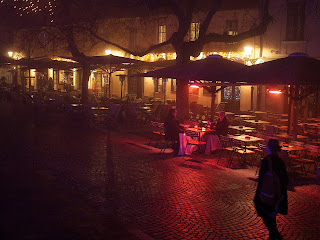Sir 3:2-6, 12-14
Ps 128 or 105
Lk 2:41-52
Today’s feast of the Holy Family reminds us that Jesus was born into and raised within a family. The immediate family was small but there are hints that Jesus grew to adulthood within the context of a larger extended family. Perhaps clan might be a better word.
He lived in a particular social world, at a specific time in history, in a definite place. Jesus’ world was governed by the religious traditions and laws of Israel.
His parents observed the traditions and laws regarding circumcision, purification,
dedicating the first born male to the Lord, and, as we hear today, going up to Jerusalem for the Passover.
The story of Jesus, is a very human story. We can identify with those human dimensions and rejoice that we share our humanity with that of the Holy Family.
We can identify with the narrative of Jesus being separated from his parents while in Jerusalem, each of us in his or her own way. Any parent today can identify with his parents' frantic response when they realized he was not with them. We can also understand Mary's obvious annoyance when she asked,
"why have you done this to us?" How did she enunciate those words? Did she sound angry or relieved?
Like us, Jesus was carried in his mother's womb and endured the messiness of childbirth. Like us, Jesus began life as a helpless infant who grew into adulthood. Jesus was like us in all things but sin. He did not put in a cameo appearance on earth shifting his shape or appearance to suit various needs
only to return to a distant mountaintop after wreaking vengeance on an enemy god or goddess.
Jesus did not remain aloof from life on this earth, with its trials, tribulations,
joys and sorrows. Rather, he experienced them fully. The late Jesuit theologian Karl Rahner points out that Jesus “came into the world the same way we did
in order to come to terms with the given facts of human existence, and to begin to die”
And to begin to die.
There were hints of that future death in Simeon’s cryptic comment to Mary:
“and you yourself, a sword will pierce” or, in another translation “and a sword will pierce through your own soul also.” What did Mary feel when she heard these words? Did she recall them as she admonished Jesus in today's gospel? Did they echo in her ears as she stood at the foot of the cross?
No fear surpasses that of a parent whose child is missing. No grief exceeds that of a parent who endures the death of a child at any stage of the child’s life, from life in the womb to death when both parent and child old. Mary knew that fear and unimaginable pain.
The Feast of Holy Family challenges us to pray for families, particularly those that are fragmented, and those that are under attack. We pray for those families hat are unstable because of divorce, casual live-in arrangements with no commitment, and pregnancies that never involved a father, or at least one who maintained no presence following conception.
The Feast of the Holy Family challenges us to recognize Jesus when we encounter Him and wherever we encounter Him. It challenges us to recognize
the sanctity of the family, and to preach that sanctity at every opportunity.
The challenges are significant. We are, after all, sinners who don’t always get it right. But we have the example of the Holy Family.
The example of Mary’s yes, at the Annunciation“ may it be unto me according to your word.” The example of Joseph’s silent yes to the angel who instructed him: “Do not fear to take Mary your wife . . .”The example is in Jesus’ yes at Gethsemane, “not as I will, but as thou wilt.”
As we commemorate the Holy Family as we contemplate their yes to the will of God we pray that we will also say yes.
__________________________________________________________
Photos from one of the best Christmases I had in years. It was 2016 while in Ljubljana, slovenia. It was the only day our main meal was in the evening rather than at noon. I wandered the city for hours that day, and a few others, shooting. The straw nativity halfway down was an amazing scene.
Have a Blessed New Year
Fr. Jack, SJ, MD




























